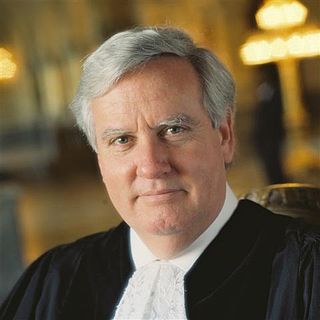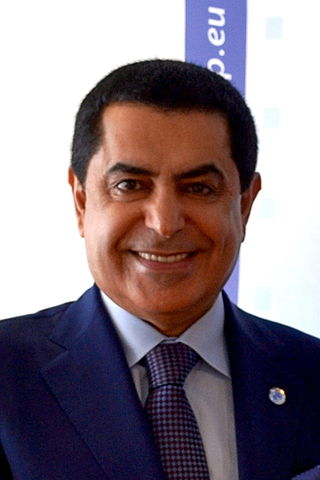
The International Court of Justice, also called the World Court, is one of the six principal organs of the United Nations (UN). It settles disputes between states in accordance with international law and gives advisory opinions on international legal issues. The ICJ is the only international court that adjudicates general disputes between countries, with its rulings and opinions serving as primary sources of international law.

The United Nations General Assembly is one of the six principal organs of the United Nations (UN), serving as its main deliberative, policymaking, and representative organ. Currently in its 78th session, its powers, composition, functions, and procedures are set out in Chapter IV of the United Nations Charter. The UNGA is responsible for the UN budget, appointing the non-permanent members to the Security Council, appointing the UN secretary-general, receiving reports from other parts of the UN system, and making recommendations through resolutions. It also establishes numerous subsidiary organs to advance or assist in its broad mandate. The UNGA is the only UN organ where all member states have equal representation.

Sir Christopher John Greenwood is Master of Magdalene College, Cambridge and a former British judge at the International Court of Justice. Prior to his election, he was professor of international law at the London School of Economics and a barrister who regularly appeared as counsel before the International Court of Justice, the European Court of Human Rights, the English courts, and other tribunals.
Abdul Gadire Koroma is a Sierra Leonean jurist. He was the ambassador of Sierra Leone to the United Nations between 1981 and 1985. He served two terms as judge at the International Court of Justice.

Xue Hanqin is a Chinese jurist at the International Court of Justice. On 29 June 2010, she was elected to fill the vacancy created by Shi Jiuyong's resignation on 28 May 2010. She is one of three female judges serving on the International Court of Justice (ICJ) and one of only four women elected as members of the Court to date. Xue is the fifth Chinese judge at the ICJ, and the third representing the People's Republic of China.

Dalveer Bhandari is one of the judges of the International Court of Justice. He is a former judge of the Supreme Court of India. He is also the former chief justice of the Bombay High Court and a judge of the Delhi High Court.
Joan E. Donoghue is an American lawyer, international legal scholar, former U.S. State Department official, and the current president of the International Court of Justice (ICJ). She was first elected to the court in 2010, re-elected in 2014, and elected by the ICJ judges to be president of the ICJ in 2021. She is the third woman to be elected to the ICJ and the first American woman elected as president of the Court.

Julia Sebutinde is a Ugandan judge serving her second term on the International Court of Justice following her re-election on November 12, 2020. She also is the current chancellor of Muteesa I Royal University, a university owned by Buganda kingdom. She has been a judge on the court since March 2012. She is the first African woman to sit on the ICJ. Before being elected to the ICJ, Sebutinde was a judge of the Special Court for Sierra Leone. She was appointed to that position in 2007.

The Sixty-sixth Session of the United Nations General Assembly opened on 13 September 2011 at 15:00 and was presided over by former Qatari permanent representative to the UN Nassir Abdulaziz Al-Nasser. The session ended on 18 September as al-Nasser symbolically passed the gavel to the president of the next session, Vuk Jeremic.
The 2011 International Court of Justice election began on 10 November 2011 at United Nations Headquarters in New York City. In the set of triennial elections, the General Assembly and the Security Council concurrently elect five judges to the Court for nine-year terms, in this case beginning on 6 February 2012. From the eight candidates, the five winners were Giorgio Gaja (Italy), Hisashi Owada (Japan), Peter Tomka (Slovakia), Xue Hanqin (China) and Julia Sebutinde (Uganda).
The 2014 International Court of Justice election began on 6 November 2014 at United Nations Headquarters in New York City. In the set of triennial elections, the General Assembly and the Security Council concurrently elect five judges to the Court for nine-year terms, in this case beginning on 6 February 2015.
The 2020 International Court of Justice election were held on 11 and 12 November 2020 at the United Nations Headquarters in New York City. In the set of triennial elections, the General Assembly and the Security Council concurrently elect five judges to the Court for nine-year terms, in this case beginning on 6 February 2021. From the eight candidates, Yuji Iwasawa (Japan), Xue Hanqin (China), Peter Tomka (Slovakia), Julia Sebutinde (Uganda), and Georg Nolte (Germany) have been elected members of the International Court of Justice for a term of office of nine years, as both the Security Council and the General Assembly have agreed on the same candidates.
The 2018 International Court of Justice election was held on 22 June 2018 at the United Nations Headquarters in New York City. The General Assembly and the Security Council concurrently elected Yuji Iwasawa (Japan) to the International Court of Justice until 5 February 2021. He served the remainder of the nine-year term of office that had been held by Hisashi Owada (Japan), whose resignation from the Court took effect on 7 June 2018.
The 2021 International Court of Justice election was held on 5 November 2021 at the United Nations Headquarters in New York City. The General Assembly and the Security Council concurrently elected Hilary Charlesworth (Australia) to the International Court of Justice for remainder of the nine-year term of office that had been held by Judge James Crawford (Australia).
The 2022 International Court of Justice election was held on 4 November 2022 at the United Nations Headquarters in New York City. The General Assembly and the Security Council concurrently elected Leonardo Nemer Caldeira Brant for remainder of the nine-year term of office that had been held by Judge Antônio Cançado Trindade, who died in May, 2022.
The 2023 International Court of Justice election is scheduled to be held on 9 November 2023 at the United Nations Headquarters in New York City. In the set of triennial elections, the General Assembly and the Security Council concurrently elect five judges to the Court for nine-year terms.
The 1946 International Court of Justice election took place on 6 February 1946 in Westminster Central Hall, London. This was the first ever election of Judges of the Court, one the six "principal organs" of the newly created United Nations. All 15 seats were to be filled.
The 1948 International Court of Justice election took place on 22 October 1948 in the Palais de Chaillot, Paris. This was the second ever election of Judges of the Court, one the six "principal organs" of the United Nations, and the first one to be held in order to fill five judges' seats. It thus launched the pattern of triennial elections whereby the General Assembly and the Security Council concurrently elect five judges to the Court for nine-year terms, in this case beginning on 6 February 1949.
The 1951 International Court of Justice election took place on 6 December 1951 at the Palais de Chaillot, Paris. This was the third election of Judges of the Court, one the six "principal organs", and the second one to be held in order to fill five judges' seats. It thus continued the pattern of triennial elections whereby the General Assembly and the Security Council concurrently elect five judges to the Court for nine-year terms, in this case beginning on 6 February 1952.
The 1954 International Court of Justice election took place on 7 October 1954 at the Headquarters of the United Nations in New York. In the set of triennial elections, the General Assembly and the Security Council concurrently elect five judges to the Court for nine-year terms, in this case beginning on 6 February 1955. In this particular case, a sixth vacancy was to be filled due to the death of one of the judges.






